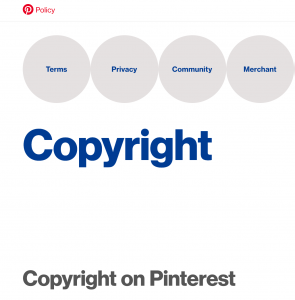Pinterest Defeats Contributory Copyright Infringement Claim–Davis v. Pinterest
 This is a copyright infringement case against Pinterest for allegedly infringing “pins” by users. The plaintiff alleged claims for direct and contributory copyright infringement. Pinterest moved to dismiss the claim for contributory infringement. The court grants the motion.
This is a copyright infringement case against Pinterest for allegedly infringing “pins” by users. The plaintiff alleged claims for direct and contributory copyright infringement. Pinterest moved to dismiss the claim for contributory infringement. The court grants the motion.
In addition to the direct infringement by someone else (in this case, presumably the users doing the pinning), the prima facie elements of contributory infringement require that the defendant (1) know of the infringing activity and (2) either make a material contribution to or induce the infringement. The court focuses on the first requirement and says that a defendant must have actual knowledge of specific infringements. Here’s a key passage from the ruling:
In Napster, the Ninth Circuit suggested that under some circumstances, constructive knowledge could satisfy the knowledge element of contributory liability. However, the Court explained that if an online file sharing service was capable of “substantial noninfringing use,” then constructive knowledge alone was not sufficient to impose liability for contributory infringement. The Court therefore confirmed that “in an online context, evidence of actual knowledge of specific acts of infringement is required to hold a computer system operator liable for contributory copyright infringement.” In Amazon and Giganews, the Ninth Circuit upheld the Napster test, again emphasizing that knowledge for purposes of contributory liability must be of specific infringing material. [emphasis added]
The court says even assuming that constructive knowledge is sufficient, there still needs to be an allegation that a defendant can be charged with constructive knowledge of specific acts of infringement. The court cites to an exchange between plaintiff and Pinterest where Pinterest asks the plaintiff to point to specific files plaintiff would like removed, but plaintiff said it was “impracticable to provide this information.”
Plaintiff also tried to argue willful blindness but the court isn’t sold. Willful blindness “still requires allegations that Defendant was blind to the specific instances of infringement at issue . . .”
__
This seems like a big win for Pinterest. I don’t recall a court assessing a claim for contributory infringement claim against Pinterest on the merits. A quick LEXIS search does not reveal any cases.
The plaintiff tried to rely on aspects of Pinterest’s design and its reputation as support for the claim of contributory infringement. The court rejects this argument, instead requiring plaintiff to show that Pinterest was aware of infringements of plaintiff’s photos on the platform. This is a tough burden to meet unless the plaintiff has made the platform aware of the infringements (typically via a DMCA takedown notice). The court cites to plaintiff’s exchanges with Pinterest but does not mention whether plaintiff sent DMCA takedown requests. (Note to plaintiffs: if you’re going to have back and forth with a platform, you may as well send a DMCA takedown request.)
A big question is whether Pinterest is like Napster (and Grokster). The court does not think so. (Writing this post made me take a trip down memory lane, and pull up Eric’s “happy one year anniversary” post on Grokster from 2006!)
Given there is a claim for direct infringement remaining, it looks like there’s some activity left in this case (which has had a lot of procedural wrangling, including a failed attempt to certify claims on behalf of a class). It will be interesting to see if the plaintiff has energy to appeal this one.
Case citation: Davis v. Pinterest, Inc., 2021 WL 879798 (N.D. Cal. Mar. 9, 2021)
Related posts:
Happy (?) Anniversary, Grokster v. MGM
IAP Defeats Vicarious Copyright Infringement Claim–UMG v. Bright House
DMCA Safe Harbor Applies to Some Unfair Competition Claims–Capitol Records v. Vimeo
Are Internet Access Providers Liable for Their Subscribers’ Copyright Infringements?–UMG v. Grande
Cox Loses DMCA Safe Harbor but Gets a New Trial on Contributory Infringement–BMG v. Cox
DMCA Safe Harbor Doesn’t Protect Zazzle’s Printing of Physical Items–Greg Young Publishing v. Zazzle
Amazon Doesn’t “Sell” Its Marketplace Goods–Milo & Gabby v. Amazon
Copyright Office Q&A Session About The New Online DMCA Designated Agents Directory
Stock Music Library Wins DMCA Safe Harbor Defense–Hempton v. Pond5
Another Tortured DMCA Online Safe Harbor Ruling–EMI v. MP3Tunes
Copyright Office Gratuitously Kills the DMCA Safe Harbor For Thousands of Websites
Redfin Defeats Copyright Claims Due to MLS License Agreement
Message Board Operator May Be Liable For Moderator’s Content–Enigma v. Bleeping
Sideloading Service Defeats Copyright Infringement Claims–BWP v. Polyvore
Vimeo’s Second Circuit DMCA Safe Harbor Win Over Capitol Records
